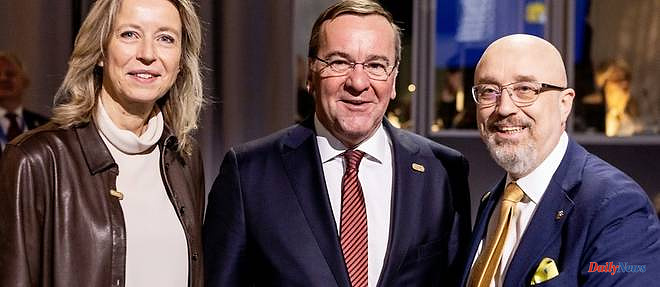Against the backdrop of calls to build a "war economy", European Union defense ministers negotiated on Wednesday a plan for the delivery of shells and ammunition to Ukraine which could be increased to two billion euros. euros.
The Ukrainian army, which fires thousands every day to repel the Russian invader, continues to warn in particular of its glaring lack of 155 mm shells for its guns.
"Our number one priority is air defense systems, as well as ammunition, ammunition, and more ammunition," Ukrainian Defense Minister Oleksiy Reznikov reiterated.
Meeting in Stockholm with NATO Secretary General Jens Stoltenberg, his European counterparts refined a three-pronged plan, including a donation of one billion euros of shells to Ukraine, which should be adopted on March 20 .
The objective is to accelerate the pace, while the Ukrainian army is threatened with encirclement on the hot spot of Bakhmout, in the east of the country.
Based on large joint purchases to reassure manufacturers about the continuity of orders, the project aims both to meet the immediate needs of Kiev and to boost the capacities of the European defense industry in the longer term.
The first part, designed by EU diplomats, aims to use one billion euros drawn from the European Peace Facility (EFF) to deliver within a few weeks shells already in stock in the armies of the Member States.
Ukraine's European allies have already drawn heavily on their military stocks, with support amounting to 12 billion euros, including 3.6 billion from the FEP.
Despite already low stocks before the war for many armies, and seriously depleted, the European states felt they still had a margin to meet Ukrainian needs.
"Everyone agrees on the urgency to act because everyone agrees on the objective of helping Ukraine as much and as quickly as possible", declared the head of European diplomacy Joseph Borrell.
He offered to release an extra billion from the EFF for a group order for Ukraine.
The plan also includes encouraging shell manufacturers to increase their capacities.
Ukraine wants more.
"It's not enough, because we need a million shells, so about four billion euros," pleaded Mr. Reznikov. "We need more!".
The EU also wants to avoid seeing its plan hampered by bureaucracy.
The choice is oriented towards contracts awarded by the defense agency of the European Union rather than via Member States, with more experience of this type of purchase.
Another point of disagreement: the solution consisting in buying shells outside Europe, a way of going faster according to some, but without supporting the European military-industrial complex, others worry.
"If there are possible deliveries from other countries, I do not believe that we should exclude this possibility", however estimated the Swedish Minister Pål Jonson.
On the other hand, the consensus reigns within the 27 on the fact that after the many years of post-Cold War military disinvestment, it is necessary to prepare again for conflicts between powers.
“We are at a decisive moment in our support for Ukraine, and it is absolutely imperative that we move towards a form of war economy mode,” insisted the European Commissioner for the Internal Market, Thierry Breton.
A martial vocabulary that goes too far, however, estimated the German Minister, Boris Pistorius.
"It would be a deadly signal", meaning that "we subordinate everything to the production of arms and ammunition", he said. "We, the EU and Germany, are not at war," he insisted.
08/03/2023 21:17:44 - Stockholm (AFP) © 2023 AFP












